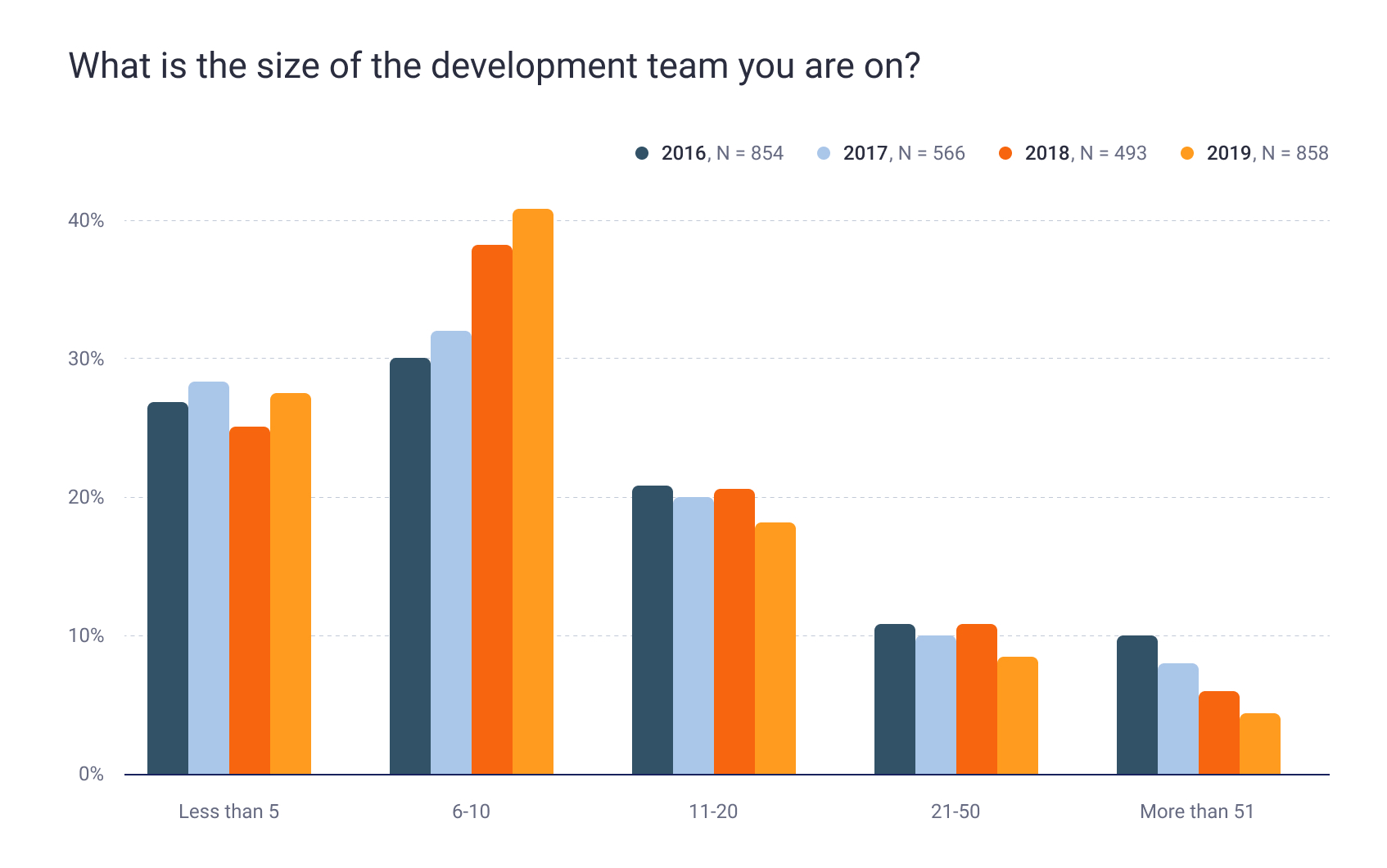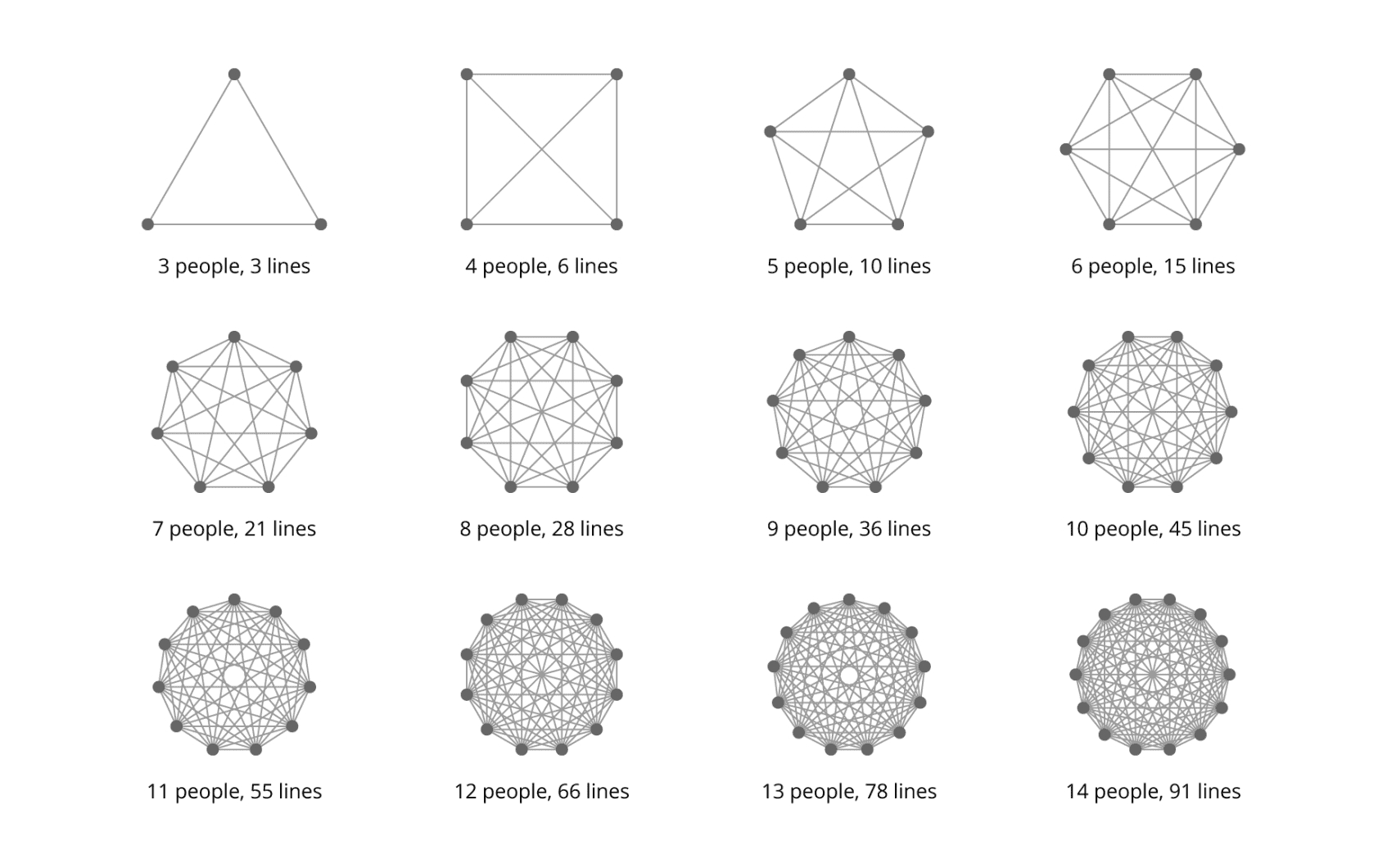Software complexity has increased significantly over the past decades. Modern enterprise software systems can cover all departments’ needs of the largest companies, provide access to dozens of valuable functions via desktops and mobile devices, and even enable the benefits that artificial intelligence and machine learning provide. However, it doesn’t mean that software companies extensively increase the size of their development teams according to the complexity of the applications they create. According to The 2019 State of Code Review performed by Smartbear (they surveyed more than 1000 developers), the size of an average development team is more often ranges between 6 and 10 developers: At first glance, it may seem that such a state of affairs does not imply any unpleasant consequences. After all, managing such a small team of developers is not rocket science. The thing is, nowadays, efficient development requires more than a combination of the right tech skills. The development process may take months or even years, and hassle-free interactions between team members may become as important as the code they write. The number of possible interactions between the members of a group increases significantly with each new member:
At first glance, it may seem that such a state of affairs does not imply any unpleasant consequences. After all, managing such a small team of developers is not rocket science. The thing is, nowadays, efficient development requires more than a combination of the right tech skills. The development process may take months or even years, and hassle-free interactions between team members may become as important as the code they write. The number of possible interactions between the members of a group increases significantly with each new member:

Image Source: https://getlighthouse.com/blog/developing-leaders-team-grows-big/
In a 6-10 developers team, there will be 15 to 45 possible lines of interactions between people with unique personalities, different preferences, and views on how the project should develop. This circumstance may add a new layer of complexity. Luckily, that’s precisely when soft skills can come to the rescue.
Are Soft Skills Less Important than the Hard Ones
The short answer is “No.” When we talk about technical or administrative expertise specific to a particular field of application, we usually mean so-called hard skills. On the other hand, soft skills is a term that describes a person’s ability to interact and collaborate with other people, accept their opinions, adapt to new conditions of work, and resolve conflicts with colleagues. Unlike hard skills, soft skills are essential for every professional, regardless of the field of activity.
These skills play an essential role in personal life and also can influence a person’s career, be it a football player or a software engineer. Despite the apparent belonging to the category of innate abilities, soft skills can be trained in the same way as the ability to write code that other programmers can understand or the superpower allowing you not to leave a dirty coffee mug in the sink of your office kitchen. Therefore, even if a specific person is not a natural-born communicator, nothing prevents him or her from making some effort to invest in a pleasant work environment that can significantly impact overall productivity.
As a result, the development team will feel less emotionally drained towards the end of the project, and the customer will be assured that the product will be delivered on time. Now, let’s take a look at some examples of soft skills necessary for each person involved in software development.
Soft Skills Needed to Develop Better Software
The need to share ideas and discuss problems appearing during the work on the project leads to the need for developed communications skills. Since one of the major tasks for developers is to simplify the communication between people and make it more accessible, it would be rather strange if it turned out that they can’t communicate freely with each other. However, it’s important to note that the effectiveness of communication can depend on the company’s policy that may or may not support developers’ intentions to speak freely in meetings and discuss specific questions with clients.
During the coronavirus outbreak, the importance of this soft skill becomes even higher since many developers have to work from their homes and the burden of starting and supporting a discussion on a specific topic lays on their shoulders. Therefore, it’s crucial to ensure that all developers possess the skills allowing them to interact with their colleagues and clients, and understand how their words can impact other people.
The talent to understand your teammates’ current mood, accept their beliefs and principles, and adapt your behaviour to their current needs is a set of soft skills that are united under the term “empathy.” This skill can be developed during the time of teamwork but also requires some personality traits. It allows a person to predict how particular words or actions will affect others and helps to tailor our way of speaking. This soft skill can also become handy during the conversation with clients thanks to the ability to see things from their point of view.
Suppose a web applications development company client without any tech expertise wants to clarify how a specific feature of a web app works and how it can help his business. In the best-case scenario, a developer with excellent soft skills will try to avoid complex technical terminology and condescending tone to help the client feel more comfortable.
Even the best teams of highly skilled professionals can face conflicts and misunderstandings. In such cases, the ability to remain patient and resolve conflict situations can be crucial. Software creation is a complex and lengthy process, which in itself requires a lot of patience, and many unpleasant situations can happen along the way.
Say a young developer wants to prove himself well, but the solution he proposes may not be the most suitable due to the Dunning- Kruger effect. In this case, soft skills can help team leads to resolve delicate situations without shouting “I’m the boss here, so I’m right!” A clear explanation of why the project should develop this way and not the other can be a more suitable solution that can make everyone happy.
The ability to change your opinion on a specific subject as information contrary to your beliefs appears is one of the most important and most difficult to learn skills. Since the software development process implies creative approaches, open-mindedness and adaptability may be considered an example of a vital soft skill. When a developer keeps the mind open to new ideas, the chances that an unexpected complex problem will find an elegant solution will be significantly higher.
If somebody tries to offer a solution that seems inapplicable, the will to consider it may inspire something great. After all, having a dozen “bad” ideas in your possession is better than using a proven approach over and over again if it does not produce the desired result. Of course, not all of them will turn into something useful, but your willingness to experiment and try something new may eventually pay off.
A typical software development company includes many different specialists with different areas of responsibility. Some of them manage projects, some of them manage other people. What unites them all is the need for effective time management, another soft skill worthy of mention. The ability to give estimates and stick to them is one of the key aspects determining the overall project’s success. Complex software solutions consist of many interacting elements, each of which is the area of responsibility of a specific project manager, developer, designer, QA engineer, etc.
Read Also Web Development Team Structure. Key Specialists and Their Roles
A single person’s inability to effectively manage working time may cause frustration among other employees and unmet deadlines. Efficient time management is a skill that requires more than the ability to determine how long it takes to write code needed to implement certain functionality. In some cases, it’s essential to be able to say “No” when a colleague asks you to take care of one more task without risking sounding rude.
Conclusions
There’s something more under the hood of a successful software solution than just code. Such barely measurable aspects as empathy and communication skills sometimes can play a decisive role in the productivity of the development team and its ability to solve problems in a timely manner. It’s crucial to note soft skills can develop over time, just like any other ability of a human being. The good news is that most of these skills are already in our possession. The next step is to recognize their value and start working on improving them.
If you’re looking for a reliable team of software developers, don’t hesitate to contact us. We’ll be happy to discuss your project.